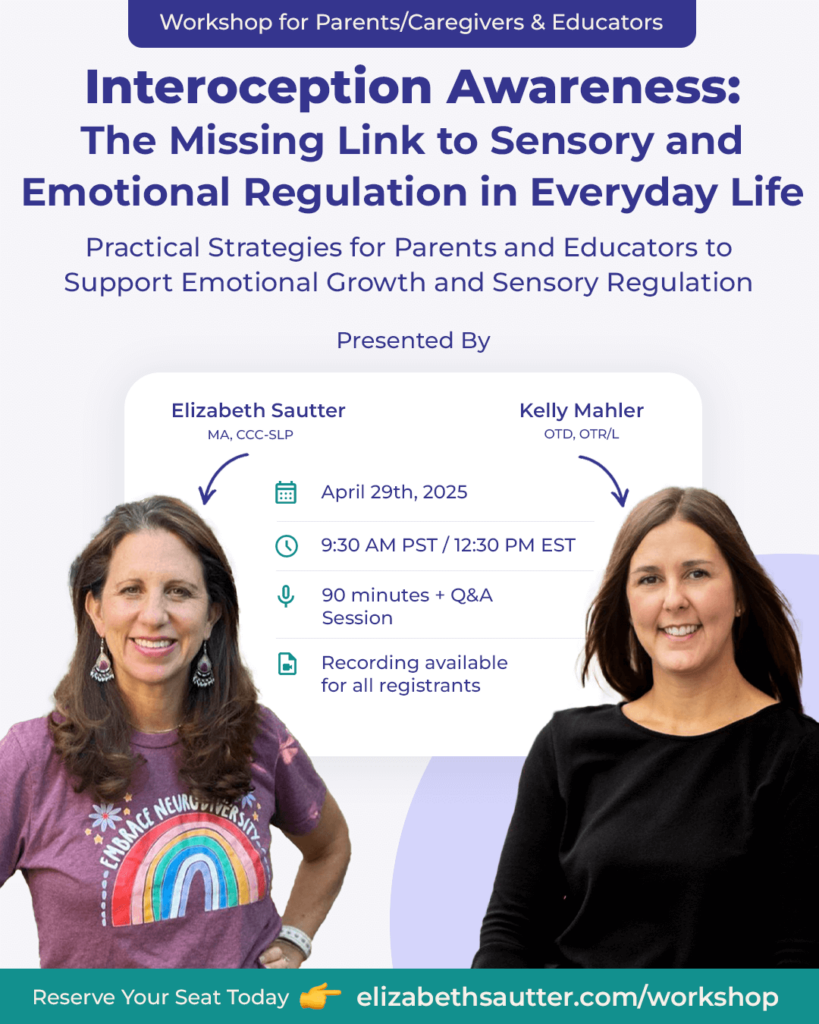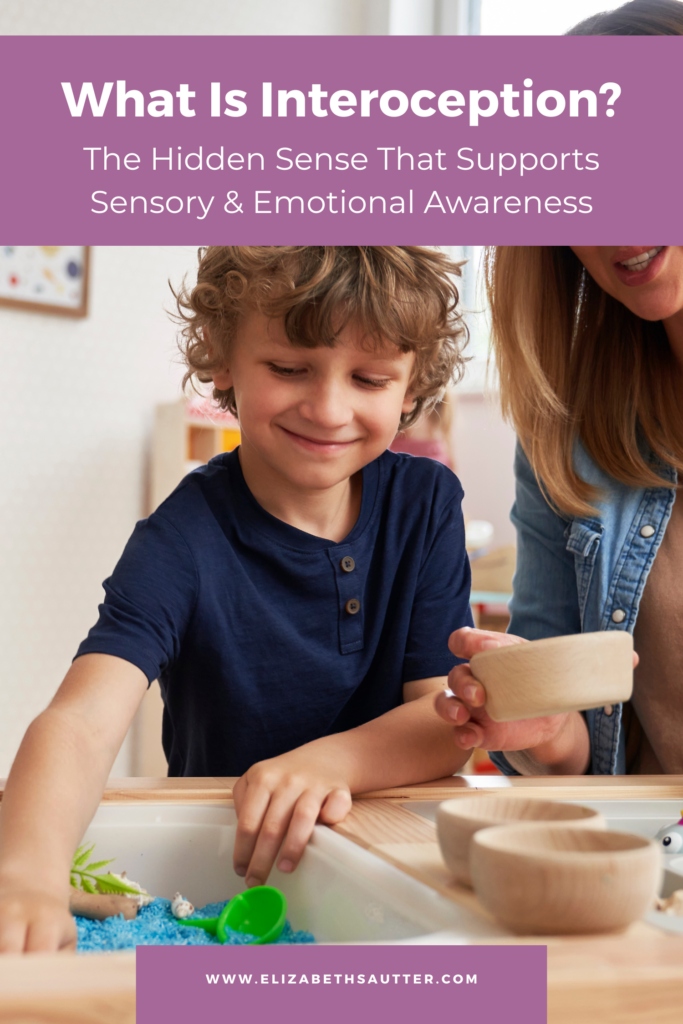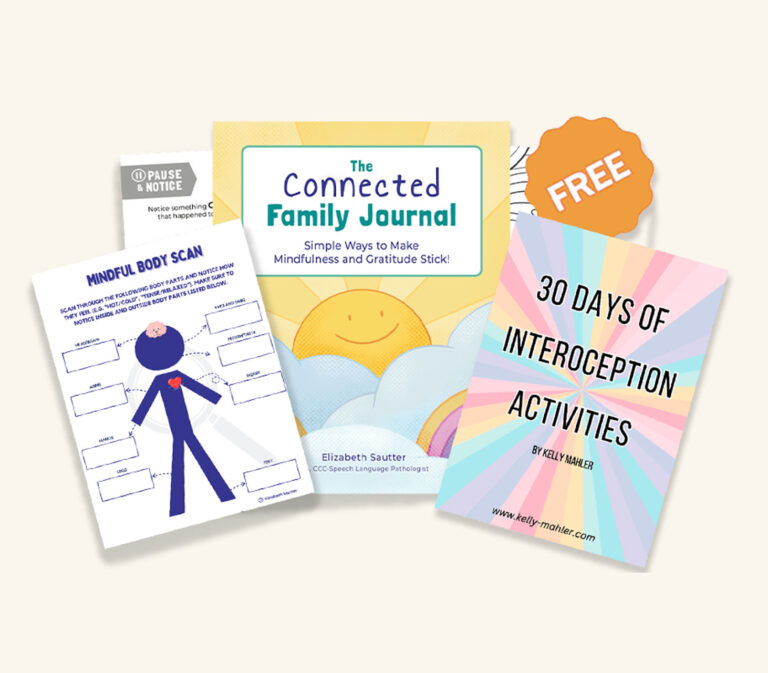Ever wonder why emotions and behaviors feel unpredictable? Interoception—our internal sense of what’s happening in our bodies—plays a key role in sensory and emotional awareness. Learn how to strengthen interoceptive awareness with intentional, everyday strategies, plus grab your FREE Everyday Interoception Kit and join our upcoming workshop with Dr. Kelly Mahler!
The Moment I Realized My Son Needed More Interoceptive Awareness
I’ll never forget the day my son had a huge meltdown in the car on the way home from school. He was irritable, frustrated, and near tears—but when I asked what was wrong, he said, “I don’t know!”
After some deep breaths and a snack I happened to have in my bag, he seemed more regulated. Then, in a much different tone, he said, “I think I was just hungry.”
That moment was a lightbulb for me. He wasn’t trying to be difficult—he just didn’t recognize the signals and sensations his body was giving him that he was hungry which turned into discomfort and dysregulation.
I later learned that this skill—noticing and understanding body signals—is due to something called interoception. And for many kids, including autistics, ADHDers and those sensory processing differences, these signals can be hard to detect, interpret, or act on in a timely way.
Dr. Kelly Mahler, a leading expert in interoception, explains:
“Interoception is the sense that allows us to notice and make sense of body signals like hunger, thirst, needing to use the bathroom, or feeling anxious.”
If we don’t notice and/or understand these signals, we can’t meet our body’s needs —leading to meltdowns, shutdowns, sensory overwhelm, or even incontinence because the need wasn’t recognized in time.
Learn more from Dr. Kelly Mahler: What is Interoception?
Why Do Some Kids Struggle with Interoception?
Interoception is constantly at work, gathering information from our heart, lungs, stomach, muscles, skin, and more to help us understand what’s happening inside our bodies. But not everyone experiences interoceptive signals in the same way.
Many neurodivergent individuals experience body signals that are muted and/or intense :
✔️ Intense – Some individuals experience strong interoceptive signals, which can feel overwhelming. For example, they may notice hunger too intensely, feel anxious with even small changes in heart rate, or struggle with discomfort from itchy clothing or temperature shifts.
✔️ Muted – Others may not notice body cues easily. They might not feel thirst until they are dehydrated, miss early signs of stress or anxiety, or struggle to recognize when they need a break until emotions become intense.
When kids struggle with interoceptive awareness, they may:
🚗 Get “hangry” without realizing they need food
🚽 Struggle with bathroom accidents because they don’t notice the signals in time
💤 Seem exhausted but refuse to rest because they can’t tell when they’re tired
😡 Have sudden emotional outbursts without recognizing the feelings building up
These challenges aren’t behavioral—they’re biological. The good news? Interoceptive awareness can be strengthened with simple, everyday strategies.
Join our upcoming workshop to learn practical ways to support interoception! Sign up here
How to Help Kids Strengthen Interoceptive Awareness
1. Pause & Tune In: Build Awareness with Mindfulness
Mindfulness—pausing before responding and intentionally noticing body signals—is a powerful way to build interoceptive awareness.
Encourage check-ins throughout the day:


Model self-awareness:

At first, kids might not have an answer—and that’s okay! The goal is to increase awareness over time, without pressure.
2. Become a Social-Sensory Detective
Because interoception is an internal sense, it can feel abstract. Help kids become “social-sensory detectives” by making it more concrete:
✔️ Use a Body Scan – Slowly check in with each part of the body, from head to toe or toe to head, noticing warmth, tightness, tingling, or movement.
✔️ Use Sensory-Friendly Supports – Offer movement breaks, breathing exercises, stretching, or fidget tools to help them explore what helps them feel comfortable.
✔️ Tie Check-Ins to Daily Routines – Instead of just asking, “Do you have to use the bathroom?”, try:
“Before we get in the car, let’s check in with our body—do you feel like you need to go?”
3. Support Awareness Through Predictable Routines
Interoceptive awareness grows through consistent, gentle check-ins and structured supports.
🌟 For kids who get hangry:
Keep snacks readily available in backpacks, purses, and the car. Instead of waiting until they’re upset, build regular snack breaks into the day.
🌟 For kids who struggle with bathroom awareness:
Use routine-based reminders:
✔️ Before transitions (“Before we leave the house, let’s check in with our body.”)
✔️ After meals or playtime (“Let’s take a quick break to check in with our body.”)
🌟 For kids who don’t recognize tiredness:
Make rest time predictable and sensory-friendly:
✔️Offer cozy spaces with pillows, weighted blankets, or calming music
✔️Try dim lighting in the evening to signal wind-down time
🔗 Want hands-on strategies? Join us for our upcoming workshop! Register here
FREE Everyday Interoception Kit: Tools to Support Sensory & Emotional Growth
Download Your Free Kit to Start Strengthening Interoception Today!
✅ 30 Days of Interoception Activities – Quick exercises to build body awareness
✅ Mindful Body Scan – A guided practice to tune into sensations
✅ The Connected Family Journal – Fun prompts to strengthen connection & gratitude
Perfect for home, school, or therapy settings!
Join Our Upcoming Workshop: Interoception & Emotional Awareness
Want to dive deeper into how interoception impacts emotions, behavior, and regulation? Join me and Dr. Kelly Mahler for an interactive workshop where we’ll explore:
✔️ Why some kids struggle with interoception—and what to do about it
✔️ Practical, neurodiversity-affirming strategies to build body awareness
✔️ How to integrate interoception into daily routines in a natural way




By making interoception part of everyday routines, we empower kids to understand their bodies, meet their needs, and regulate with more ease. Let’s support them in building this essential skill!



